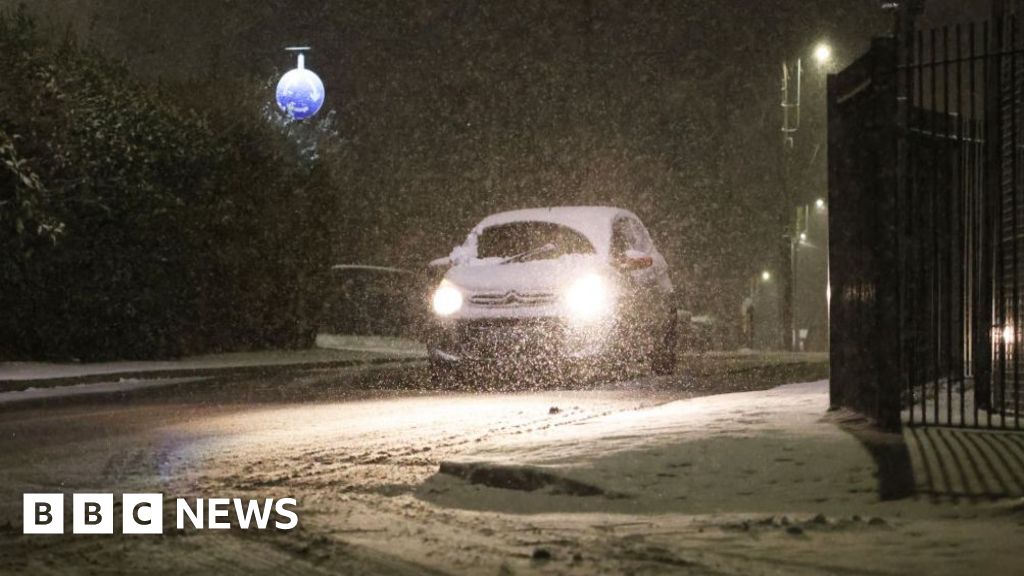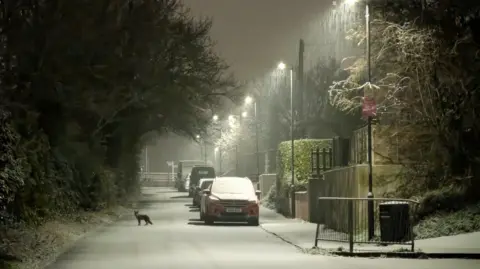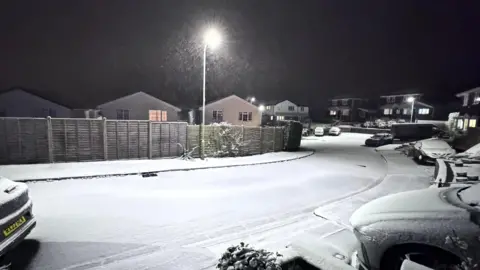
Parts of the UK are bracing for considerable disruption as heavy snow and freezing rain hit the country, with amber weather warnings now in force.
Areas of northern England, the Midlands and Wales are forecast to be among the worst hit as wintry weather pushes northwards throughout the night, possibly bringing 20-40cm (7.8-15.7in) of snow in some places.
Flights from Bristol Airport were temporarily suspended on Saturday evening and the Met Office has warned of possible power cuts, rural communities being cut off and travel disruption.
Less severe yellow weather warnings are also in force for parts of Scotland, Northern Ireland and elsewhere in England.
The amber weather warnings in place are:
- A warning for snow and freezing rain covering most of Wales and central England, including the Midlands and the north-west cities of Liverpool and Manchester, until noon on Sunday
- A separate warning for snow covering most of northern England including Leeds, Sheffield and the Lake District until midnight on Sunday.
Amber warnings are more serious than yellow warnings and indicate a possible risk to life, as well as more significant travel disruption.
Photographs show snow settling on the ground in a number of places around the country on Saturday evening.
Areas include many parts of Wales along with western, central and southern counties in England including Gloucestershire, Wiltshire, Hampshire, Surrey and Oxfordshire.
Bristol airport halted flights for a period of Friday evening. Operations restarted around around 23:00 GMT but passengers were warned there could be ongoing delays on Sunday and to check with their airline before traveling.
Wiltshire Police said the weather was “causing chaos” all over the county, while Avon and Somerset Police warned of significant road disruption. Both forces advised only to travel if necessary.
The National Grid said there were a number of power cuts and they were working to restore power to some properties, including in Birmingham, Bristol and Cardiff.
 suhi / BBC Weather Watchers
suhi / BBC Weather WatchersA zone of wet weather will continue to move northwards across England and Wales overnight, turning readily to snow as it interacts with the cold air that is sitting across the UK.
The heaviest snow is expected in higher parts of Wales, the Midlands and northern England with up to 30-40cm possible over the mountains of north Wales, the Peak District and the Pennines.
At lower levels some disruptive snow is likely but in places this will mix with rain – falling on cold surfaces, leading to the threat of ice.
Much of England and Wales is covered by a separate yellow warning for snow and freezing rain into Sunday, though there is uncertainty over how disruptive the adverse weather could be, with milder temperatures forecast.
Prof Liz Bentley, chief executive of the Royal Meteorological Society, told BBC Radio 4’s Today programme that freezing rain occurs when droplets fall onto surfaces at temperatures below zero degrees and instantly freeze, causing a “glazed ice” on the ground.
Eastern parts of Northern Ireland could also see a small amount of snow overnight, with up to 10cm possible over the hills.
Snow and ice will affect parts of southern and eastern Scotland through the early hours, with wintry showers in the north also giving the chance of slippery conditions.
Across southern counties of England and southern Wales any snow is likely to turn back to rain as milder air pushes in, with temperatures in parts south west England set to be as high as 12C by the end of the night.
 Emma / BBC Weather Watchers
Emma / BBC Weather WatchersOn Sunday further snow is expected to accumulate across parts of northern England, Northern Ireland and Scotland, where it will remain cold.
Heavy rain will be more of an issue across Wales, central and southern England where milder conditions will develop.
Fresh yellow weather warnings will also come into force in some areas on Sunday.
Heavy rain and thawing snow could lead to flooding in some parts of north-west England and Wales, while localised snow and ice warnings cover parts of Scotland where it will remain cold.
Temperatures are forecast to dip again from Monday, and UK Health Security Agency (UKHSA) amber cold weather health alerts for all of England remain in place.




